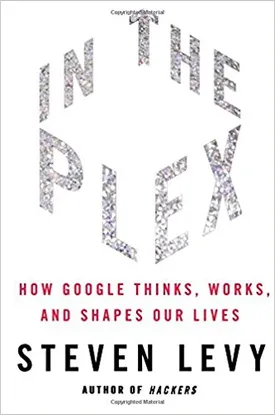In The Plex: How Google Thinks, Works, and Shapes Our Lives by Steven Levy
In The Plex: How Google Thinks, Works, and Shapes Our Lives, the newest book from author Steven Levy, examines how Google has developed from a search engine company to the most influential web corporation in history. The book dives deep into the lives of Google’s founders and how the culture of their organization shapes its success.
The book opens with an examination of Google’s origin story. Before co-founders Larry Page and Sergey Brin even went public with their search engine, they were busy at Stanford educating themselves on what could make their engine more efficient and effective. With the help of Paul Buchheit, the creator of another web search engine, they created a page ranking algorithm to determine what websites should be listed at the top of the page. This algorithm, called “PageRank”, disrupted the search engine industry by providing more relevant results than its competitors.
The book then jumps into the inner workings of Google and its culture. Levy talks about how Google employs a “hacker ethos” that encourages employees to pursue whatever ideas they find interesting no matter how absurd or impractical. He also explores how the company created “Moon Shots”, futuristic projects that are designed to revolutionize various industries. For example, Google is working on driverless cars, artificial intelligence, and space exploration.
In addition to its progress in technological innovation, Levy also looks at how Google has shaped our lives. He explains how the company’s mission to organize the world’s information and make it universally accessible and useful has enabled us to access more kinds of content more quickly than ever before. Google has enabled what Levy calls “the liberation of information”, giving us the power to connect with virtually anyone and access anything.
The book also takes a close look at Google’s business philosophy and its commitment to staying on top of every technological trend. Google spends immense amounts of time and money in research and development, and its technological superiority gives it a competitive edge. Levy describes how Google cultures its technical excellence and focuses more on the development of products and services that users want.
One of the most interesting parts of Levy’s book is his examination of how Google has changed over the years. By analyzing the evolution of Google’s mission statement and the development of products like Gmail and Google Drive, Levy is able to provide insights into how the company is adapting to the ever-changing digital landscape. He also discusses how Google is dealing with its immense power, noting the widespread criticism it has been receiving for its privacy policies and other issues.
Finally, Levy talks about how Google has made progress in its vision for the future. He cites the development of its social networking site, Google+, and the launch of its Android mobile operating system as examples of how the company is transitioning into more than just a search engine. He also explores how Google is working on projects like Google Maps and Street View to provide more accurate information to people around the world.
In The Plex: How Google Thinks, Works, and Shapes Our Lives is an insightful and engaging look at one of the most influential technology companies of the 21st century. Levy’s book provides a unique perspective on Google’s inner workings, business strategies, and its future plans. Through this book, readers will gain a better understanding of how Google is shaping our lives and the world we live in.

